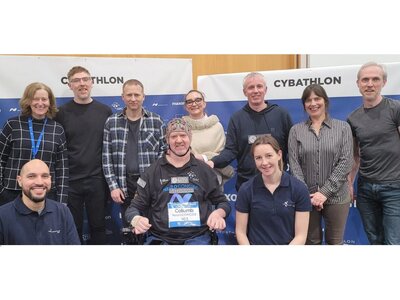
BCI / Brain-Computer Interface Race

NeuroCONCISE
United Kingdom
About the Team
The NeuroCONCISE team is led by the University of Bath’s Institute for the Augmented Human (England, https://www.bath.ac.uk/research-institutes/bath-institute-for-the-augmented-human/). Also involved is Ulster University’s Spatial Computing and Neurotechnology Innovation Hub (Northern Ireland). NeuroCONCISE is one of the more experienced BCI race teams at CYBATHLON, having competed in Zurich in 2016, the CYBATHLON BCI series Graz, Austria in 2019 (placing 3rd) – as well as in the CYBATHLON 2020 Global Edition and the recent CYBATHLON Challenges 2024, both of which were livestreamed from local hubs around the world.
NeuroCONCISE is also associated with the company of the same name, NeuroCONCISE Ltd, founded by the team leader Prof Damien Coyle, in 2016. The team specialises in researching and developing EEG-based Brain-Computer Interfaces. This BCI involves translating brain activity, modulated by movement imagination (motor imagery) into a control signal interfaced with an advanced controller to enable movement-independent racing/completion of tasks.
The NeuroCONCISE Team were winners of the BCI race at the CYBATHLON Challenges (https://www.bath.ac.uk/announcements/bath-team-uses-mind-control-to-win-international-athletics-competition/). Mr Owen Collumb (our BCI race pilot who is Irish) is currently training hard to hold this title in the upcoming CYBATHLON 2024 competition. The overall Team is diligently working to help Owen build on his success, to further enhance his performance with the strategies developed for the CYBATHLON Challenges, and to ensure optimal control for the BCI race in October this year.
NeuroCONCISE
- Visit team website
- Become a fan of this team!
University of Bath
United Kingdom

About the Pilot
Owen Collumb was an active athlete who excelled in sports like basketball, table tennis, and served as the captain of his local football team. Then in 1993, Owen's life took a significant turn after a motorcycle accident left him almost entirely paralysed from the shoulders down. The sudden and severe nature of the accident drastically altered his physical abilities and way of life.
The accident marked a challenging period for Owen as he navigated through the daunting process of rehabilitation. Despite the difficulties he faced, Owen found a silver lining in the realisation that many other young people were also coping with similar life-altering injuries. This understanding served as a source of inspiration for Owen and motivated him to find ways to cope with his new reality.
Through perseverance and a resilient attitude, Owen gradually began to adapt to his changed circumstances. He channelled his energy into supporting other disabled individuals, particularly children with muscle diseases, by facilitating access to suitable accommodation, job opportunities, and organising activities to help them integrate into society. This newfound purpose not only gave Owen a sense of fulfilment but also allowed him to make a positive impact on the lives of others facing challenges similar to his own.
Despite the profound impact of the accident on his mobility and independence, Owen's spirit remains unbroken. He continues to embrace life with a positive outlook, seeking out opportunities to make a difference in the lives of those around him. Additionally, Owen recognises the potential of emerging technologies such as Brain-Computer Interface (BCI) and is eager to leverage them to achieve new milestones, including competing at events like CYBATHLON.
Owen's journey serves as a testament to the power of resilience, compassion, and determination in overcoming adversity. Despite the hardships he has faced, Owen has emerged as a beacon of hope and inspiration, showing that with the right mindset and support system, one can navigate life's challenges and create meaning and purpose out of even the most difficult circumstances.
About the Device
The g.Nautilus Research EEG headset, developed by g.tec medical engineering GmbH, is a state-of-the-art device designed for electroencephalography (EEG) research. Key features include:
1. Wireless Technology – making it more convenient and comfortable for users.
2. High resolution – making it suitable for advanced neuroscience research, and brain-computer interface (BCI) applications.
3. High Data Quality – essential for accurate analysis.
4. Ease of Use – The system is designed to be user-friendly, with intuitive software that facilitates data collection and analysis.
5. Portability – Its compact and wireless design makes the g.Nautilus is highly portable and ideal for use in various settings including laboratories, clinics, and field research.
Consequently, the g.Nautilus Research Headset, with its advanced features and robust capabilities, meets the specifications necessary for an EEG device in Brain-Computer Interface (BCI) tasks, making it suitable for use in the Cybathlon competition.